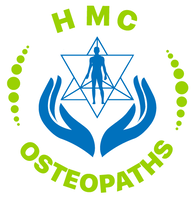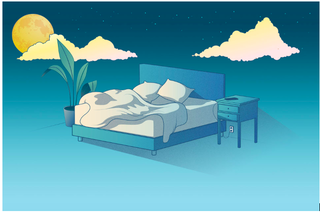 By Jamuna Edwards “Sleep is your superpower; it is your life-support system and mother nature’s best effort at immortality. Wonderfully good things can happen when you get sleep, and alarmingly bad things when you don’t, for both your brain and body” (Professor Matthew Walker). The average person will spend approximately one-third of their life asleep, yet it is something not many of us fully understand or appreciate. In this blog, I will cover some of the basics of sleep and give some advice on how you can make it your superpower! Why is sleep so important? An immense cascade of health benefits occur when we sleep. It is often thought that the brain “shuts off”, this could not be more wrong. In fact, your brain is up to 30% more active in certain stages of your sleep cycle. During the day our bodies go through many processes that cause a build-up of waste products and it is during the night, when we are in our deep sleep stages, that these wastes get cleaned away. Sleep is also when we strengthen our immune system by producing antibodies to fight illness, when we undergo tissue repair and growth, and when our minds process our experience of waking life and consolidate all of this into memories. 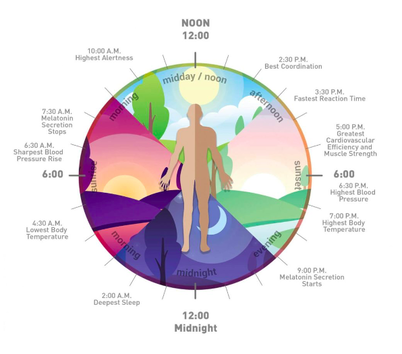 What are the stages of your sleep cycle? We have four stages of sleep, the first three are NREM (Non-Rapid Eye Movement) and the last stage is REM (Rapid Eye Movement) sleep. These stages of sleep alternate throughout the night in a cyclical fashion and different stages affect your brain and body differently! Stage 1: This is the transition from being awake to falling asleep, usually lasting 5-10 minutes. Stage 2: This is light sleep, lasting from between 10-25 minutes. During this stage your heart rate and breathing slows, your muscles relax, eye movements stop, your body temperature drops and brain waves become much slower. Your body is getting ready for deep sleep! Stage 3: Deep sleep, lasting from between 20-40 minutes. This stage is incredibly important for your overall body health, during this stage your body performs maintenance and repair all the way down to a cellular level. Tissues are repaired and regrown, bone and muscle are built, and the immune system is strengthened. This deep sleep is needed for you to feel refreshed and well-rested the next day. Stage 4: Your first REM cycle will occur approximately 90 minutes after you first fall asleep. As the night progresses each REM period will typically get longer, ranging from anywhere between 10 minutes to an hour. During REM sleep, your heart and breath rate increase, your muscles become paralysed (thought to prevent us from acting out our dreams in real life) and brain activity resembles similar levels as when you’re awake. Sometimes the brainwave activity may be even higher, and this is when we have intense and vivid dreams. REM sleep is important because it stimulates areas in your brain that are essential for learning, processing and consolidating your day’s experiences and thoughts to create short- and long-term memories. So, we can see that Stage 3 NREM deep sleep is essential to have a healthy functioning body, just as Stage 4 REM sleep is to have a healthy functioning brain! So that covers the stages of sleep, but what makes us sleepy and what wakes us up? 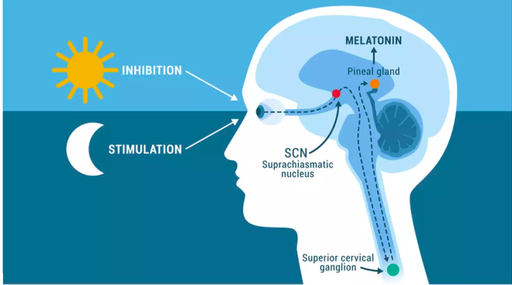 There are two body processes that drive our sleeping and waking periods. They are the circadian rhythm and the homeostatic sleep drive. Circadian rhythms are internally driven 24-hour cycles that are part of your body’s internal clock. Constantly running in the background carrying out many essential functions and playing a vital role in nearly all sys tems of the body. One of its very important roles is the sleep-wake cycle. This rhythm is primarily driven by changes in light and darkness in your surrounding environment. It is regulated by a part of the brain called the suprachiasmatic nucleus. Your brain can tell when the light is changing through the optic nerve in your eyes. As night-time comes and it begins to get dark, the pineal gland starts producing melatonin, while exposure to light prevents melatonin production; thereby synchronising our sleep-wake cycle with night and day. Your exposure to light, especially morning sunlight, strongly reinforces these patterns. Homeostatic sleep drive is the desire for sleep. It grows the longer you stay awake. This desire for sleep occurs because of a build-up of sleep-related hormones in the fluid in the brain and spinal cord, including adenosine, which helps regulate sleep patterns. As these levels increase, the desire for sleep intensifies and your body rams up the response. Then while you are sleeping this build-up of waste products is removed, restoring optimal brain function. How much sleep do we need? According to the National Sleep Foundation Guidelines healthy adults need between 7-9 hours of sleep per night. While babies, young children and teens need more as they undergo more rapid growth and development. These guidelines also recommend that 7-8 hours of sleep is essential for people aged over 65. It is important to remember that 7-9 hours of time sleeping, not just time in bed. So, if you are aiming to only get 7 hours of sleep allow for at least 7.5 hours of time in bed, depending on how easy/difficult you find it to fall asleep.  What happens when we don’t get enough sleep? Sleep is when we restore and repair, how we recover from illness, deal with stressors, consolidate memories and solve problems. While the short-term effects of not having enough sleep is something we have all likely experienced and are very aware of; it is the long-term consequences of sleep deprivation that can wreak havoc on our bodies and brains. A persistent lack of sleep leads to poorer physical and mental health and increases your risk of many health issues including: Cardiovascular disease during deep NREM sleep your heart rate slows, blood pressure drops and breathing rate stabilizes. This reduces the stress on the heart and allows it to recover from the stress placed upon it during waking hours. If you are not getting this restorative sleep your risk of high blood pressure, coronary heart disease, heart attack, and stroke increases. Diabetes sleep deprivation leads to increased levels of cortisol (stress hormone) which results in higher blood sugar levels. In an attempt to balance this out your pancreas will produce more insulin; however, it is not as effective in the presence of cortisol and over time the pancreas cannot keep up with the work of keeping your blood sugar levels normal leading to an increased risk of diabetes. Weight gain and obesity Sleep helps regulate the hunger hormones and not getting enough sleep puts you at a higher risk of overeating and craving higher-calorie dense foods. Hormonal issues Sleep and the circadian rhythms play an important role in regulating many hormones including:
Impaired immune response sleep provides essential support to our immune system. Sleep deprivation has been shown to lead to poorer immune function, including an increased risk of infection in people who sleep less than 6-7 hours. You will also be more likely to catch the common cold or flu. Pain there is a strong relationship between sleep and pain. New evidence shows that the effect of sleep on pain might be even stronger than the effect of pain on sleep. Sleep and pain have a bidirectional relationship, if you are sleep deprived you are at a higher risk of developing pain or that your pain is worsening, while your pain can cause disrupted sleep creating a worsening cycle of sleep and pain. Mental health disorders research has found that brain activity during sleep has a profound effect on our mental and emotional wellbeing. It used to be thought that poor sleep was a symptom of mental health disorders but now the evidence is saying it is mental health disorders that can be a symptom of poor sleep. Both sleep and mental health are very complex issues affected by a multitude of factors, But, considering how closely intertwined the two are, there is reason to believe that getting adequate amounts of sleep can have a very positive effect on your mental health. So now we know how vital sleep is for our overall health, how can we improve it? Prioritize your sleep and have a consistent sleep schedule! We spend so much time planning our waking life, take the time to plan your sleep. Find a night-time routine that works for you
Your daytime activities also affect your sleep quality so here are some more tips on what to do, or what not do for a better night’s sleep
What works for one person won’t necessarily work for another, so it’s worth trying out some different adjustments to find what helps you sleep best. You don’t have to change everything at once, even small changes can make a difference in improving your sleep. It is important to note that changing your sleep habits won’t always resolve sleeping problems and if you suspect you have a sleep disorder then you should consult with your GP to identify the underlying cause and how best to address it. If you want more help figuring out what would work for you any of the team here at HMC can help with lifestyle advice tailored to you and osteopathy can also help by calming the nervous system, decreasing tension in your body and helping to alleviate aches or pains that may be contributing to disrupting your sleep. References Brain basics: Understanding sleep. (2019, August 13). National Institute of Neurological Disorders and Stroke. https://www.ninds.nih.gov/Disorders/Patient-Caregiver-Education/Understanding-Sleep How Much Sleep Do We Really Need? (2021, March 10). Sleep Foundation. https://www.sleepfoundation.org Sleep deprivation. (2021, June 24). Sleep Foundation. https://www.sleepfoundation.org Sleep hygiene. (2020, December 8). Sleep Foundation. https://www.sleepfoundation.org/sleep-hygiene Walker, M. (2017). Sleep the good sleep. New Scientist, 236(3147), 30-33. https://doi.org/10.1016/s0262-4079(17)32022-5
0 Comments
Leave a Reply. |
HMC TEAMIf you find something of interest that might suit this space, or would like information on a specific topic, let us know at [email protected]
Archives
December 2023
Categories |
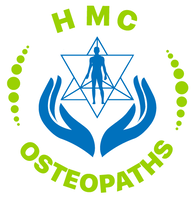
 RSS Feed
RSS Feed
